I have read about 40 books in 2018 (so far). These are my five favorites. (Modesty requires that I exclude my own books and other Counter-Currents titles.)
1. Roger Eatwell and Matthew Goodwin, National Populism: The Revolt Against Liberal Democracy (New York: Pelican, 2018).
As I mentioned in my “Toward a New Nationalism” essay, Roger Eatwell and Matthew Goodwin’s National Populism is a very exciting book. Eatwell and Goodwin marshal impressive statistics to argue that the rising tide of National Populism is based on deep-seated, long-term trends in white societies. They provide much food for thought about how White Nationalists can insert ourselves into the National Populist phenomenon and guide it toward our preferred outcomes. I look at National Populism as a kind of companion volume to The White Nationalist Manifesto, helping us envision how victory might be possible. I recommend this book to every serious movement thinker and activist. I am working on an extensive review essay, and I am planning to do a kind of seminar on YouTube in the new year to discuss it.
 2. José Pedro Zuquete, The Identitarians: The Movement against Globalism and Islam in Europe (South Bend: University of Notre Dame Press, 2018).
2. José Pedro Zuquete, The Identitarians: The Movement against Globalism and Islam in Europe (South Bend: University of Notre Dame Press, 2018).
José Pedro Zuquete is a Portuguese political scientist. He is the author of Missionary Politics in Europe (Syracuse, N.Y.: Syracuse University Press, 2007) which focuses on Umberto Bossi’s Northern League in Italy and Jean-Marie Le Pen’s National Front in France, and the co-author with Charles Lindholm of The Struggle for the World: Liberation Movements for the 21st Century (Stanford: Stanford University Press, 2010), reviewed at Counter-Currents by Michael O’Meara here. The Struggle for the World is remarkable for including a very fair-minded chapter on the European New Right as a counter-globalization movement.
Based on these books, Zuquete struck me as a very meticulous and fair-minded researcher. Therefore, when he asked to interview me for The Identitarians, I immediately said yes. He asked all the right questions. Zuquete also interviewed a large number of friends and colleagues, as well as many people I know only by name. Of course reading your interviews when reflected through the funhouse mirrors of the academic or journalistic mind is frequently like having fever dreams about the day’s events. But not so with Zuquete. He is so scrupulous that the final product is a book that allows Identitarians to speak for ourselves. The Identitarians is a very inspiring book that everyone in our movement needs to read. I will do a much more detailed review in the new year.
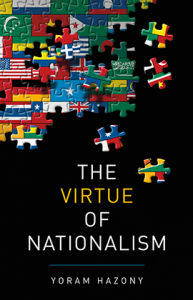 3. Yoram Hazony, The Virtue of Nationalism (New York: Basic Books, 2018).
3. Yoram Hazony, The Virtue of Nationalism (New York: Basic Books, 2018).
Yoram Hazony is an Israeli Jew. He is both a religious Jew and a Zionist. He is President of the Herzl Institute in Jerusalem, named for the founder of Zionism. The Virtue of Nationalism is a remarkably clear, incisive, and convincing case for the nation-state as the best form of government. Hazony contrasts the nation-state both with the tribe and with the empire, arguing that it is superior to both, allowing a higher level of freedom and civilization than the tribe and better ensuring peace and cultural diversity than the empire. As a religious Jew, Hazony brings forth many Biblical arguments to argue for the superiority of the nation-state, making his book especially useful for defending nationalism to Christian audiences.
Hazony, unlike many of our (((fellow white people))), does not argue for nationalism for Jews and globalism for everyone else. He argues that nationalism is the best system of government for all nations. But because he distinguishes tribes from nations, he does not believe that every stateless people deserves a nation-state. I will publish a full review in the new year.
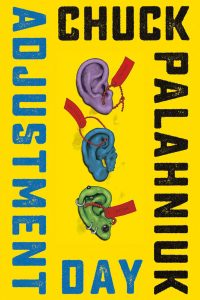 4. Chuck Palahniuk, Adjustment Day (New York: Norton, 2018).
4. Chuck Palahniuk, Adjustment Day (New York: Norton, 2018).
This is Chuck Palahniuk’s best work since Fight Club and a highly significant publishing event for White Nationalists. For more about Adjustment Day see:
- Jef Costello, “A Greater Gift than Fight Club? Chuck Palahniuk’s Adjustment Day”
- Greg Johnson, “Notes on Revolution in Chuck Palahniuk’s Adjustment Day”
- James J O’Meara, “Stephen King’s Fight Club”
- Buttercup Dew, “Adjustment Day: An Introduction to the Right”
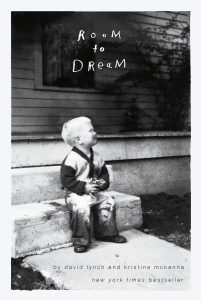 5. David Lynch and Christine McKenna, Room to Dream (Random House, 2018).
5. David Lynch and Christine McKenna, Room to Dream (Random House, 2018).
David Lynch is my favorite living film director. Room to Dream is a hybrid autobiography and biography, alternating between transcriptions of Lynch’s taped memoirs and Christine McKenna’s narratives which provide context for and fill in the gaps of Lynch’s recollections. It is an unusual format, but it works quite well, never becoming merely repetitive. This book is essential reading for understanding Lynch the man, the visual artist, and the director. One prosaic but very important insight this book gave is the importance of Lynch’s small but loyal staff in providing a humming and efficient back office for his many creative projects.
As a special bonus, I can’t resist sharing the dumbest book I read in 2018:
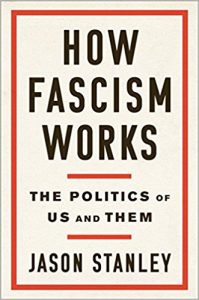 Jason Stanley, How Fascism Works: The Politics of Us and Them (New York: Random House, 2018)
Jason Stanley, How Fascism Works: The Politics of Us and Them (New York: Random House, 2018)
Jason Stanley argues that evil fascists make a distinction between us and them, unlike liberals who don’t have any enemies. Along the way, he makes sure you know that he is a Jew, descended from Holocaust survivors, and is married to a black woman. These facts, he believes, add to his credibility. He seems to believe everything he reads on HuffPo. They sure don’t make Yale philosophy professors like they used to. For a more detailed discussion, see Donald Thoresen’s Counter-Currents review here.
PS: Feel free to share your lists of the best and worst books of 2018 below.
Enjoyed this article?
Be the first to leave a tip in the jar!
Related
-
Notes on Plato’s Alcibiades I Part 1
-
Counter-Currents Radio Podcast No. 582: When Did You First Notice the Problems of Multiculturalism?
-
Remembering Dominique Venner (April 16, 1935–May 21, 2013)
-
Doxed: The Political Lynching of a Southern Cop
-
James M. McPherson’s Battle Cry of Freedom, Part 2
-
Remembering Jonathan Bowden (April 12, 1962–March 29, 2012)
-
James M. McPherson’s Battle Cry of Freedom, Part 1
-
National Socialism as a Magical Movement: Stephen E. Flowers’ The Occult in National Socialism
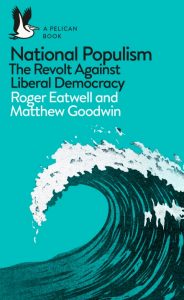
12 comments
What about Bolton’s Yockey bio? Did you read it by chance?
I have not been able to read it.
Carolyn Emerick’s “European Christmas Lore” was a great book of 2018 in the realm of the non-political arena.
Greg Johnson was on one of her podcasts awhile back too IIRC.
Any favorite history books that you read in 2018?
I read the second edition of Michael Rice’s Egypt’s Making.
I read Jan Assmann’s The Mind of Egypt, which is a masterpiece of intellectual history.
I also read his commentary on the book of Exodus, The Construction of Religion.
Generally, though, I don’t read history, just books on philosophy, religion, and politics, with the occasional biography, work of literary criticism, and work of fiction. I re-read Frank Herbert’s six Dune books this year. I also read a number of Tito Perdue’s novels.
Is there any particular reason why you don’t read history? It seems like an important subject area, no?
You can’t read everything. I was fascinated with history as a child and have a good broad understanding of world history. But it just does not interest me that much now, aside from very specific topics, such as Ancient Egypt and aspects of art history.
I’ve heard good things about Jan Assman’s “Moses The Egyptian”.
It was either you or another Counter-Currents writer who did a very good TL;DR version of it a few years back.
That said: Sigmund Freud’s “Moses And Monotheism” is basically the same topic, but much much shorter than Assman’s work— a better fit for those of us in Generation ADHD.
I highly recommend.
“Why Liberalism Failed” by Patrick Deneen. A well-written, incisive indictment of the hyper-individualism that both libertarian-styled conservatism (today’s GOP Inc) & SJW progressivism engender. Despite their apparent differences, both of these approaches share a higher level form of deracinated, expressive individualism, deliberately torn from all tradition & continuity with the past. Problem began with Enlightenment abstraction of ‘reason’. As such, the natural telos of the neoliberal project is doomed to implode. Harkens to the work of Michael Oakeshott, Alisdair MacIntyre, Christopher Lasch, & others.
I’m excited for your review of the Virtue of Nationalism. As some one who comes into orbit with White Nationalism from American Protestantism, I’ve been impressed by Hazony, both the depths of his arguments and his willingness, subtle as it is, to confront our “fellow whites” in the public sphere, as when he BTFO’ed Julia Ioffe for resenting Chtistmas, while refusing relocated to Israel.
Yes, I greatly enjoyed his asking Ioffe point blank why she thinks the Christian majority should conform itself to her tastes and expectations when she could easily move to Israel. I didn’t she that she replied.
OT but this CSPAN2 BookTV segment was playing recently. A rerun likely, but worth a quick look. It reminded me of a recent Greg podcast on Fukuyama’s latest book, and how it was a rather feeble critique of post 2014 Populism. The longer forms of this are on the CSPAN2 website.
https://www.youtube.com/watch?v=SoJtLcZRrr0
Comments are closed.
If you have Paywall access,
simply login first to see your comment auto-approved.
Note on comments privacy & moderation
Your email is never published nor shared.
Comments are moderated. If you don't see your comment, please be patient. If approved, it will appear here soon. Do not post your comment a second time.
Paywall Access
Lost your password?Edit your comment